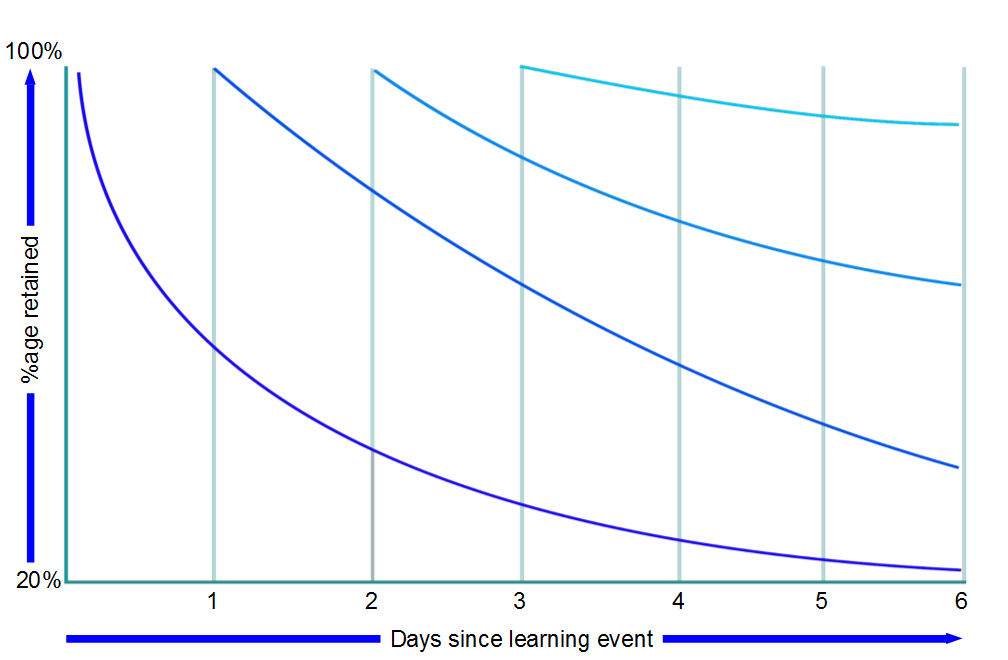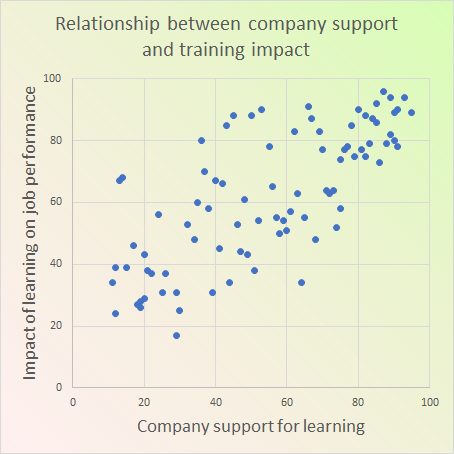Breakthrough learning discoveries from the 19th century
Born in 1850 in the German town of Barmen, Hermann Ebbinghaus was a psychologist and school teacher who performed experiments on himself and others during his research into the effect of our own memories on our ability to learn. In 1885, in a work called On Memory, he published the Ebbinghaus Forgetting Curve, which shows how much we naturally forget after learning something new.
The Ebbinghaus Forgetting Curve
reinforcement
reinforcement
reinforcement

This curve shows that a week after attending a training course, we remember only 23% of what we learnt. So if you spend, say, £2,000 on a training course yet you only retain 23% of the learning, you're paying £2,000 for £460-worth of content. Add to this that you won't necessarily remember the most relevant 23%, and the problem becomes even bigger.
But it's not all bad news. Professor Ebbinghaus also showed that if you reinforce that learning, you can push retention back up to 100%, and it then drops off more slowly.
Navanter's research into training impact
The Ebbinghaus Forgetting Curve is, of course, very old research, so at Navanter, we decided to do our own research into the impact of training in relation to organisational support for using new skills quickly in the workplace. We did this in 2017, and our research shows a remarkably similar pattern.
At the end of our courses, we asked attendees how much support they felt they would get from their organisations to use their new skills quickly. Then two months later, we asked the same attendees how much impact they felt our training had had on their jobs. The results show a clear trend that the more support they felt they'd get, the more impact the training had.
More startling, though, is that there is almost no-one who felt they'd get poor support who then found they had good job impact, and no-one who felt they'd receive good support who then had poor job impact.

Training reinforcement in 2025
So what does training reinforcement look like in the digital age? It means a 3-way-shared responsibility for maximising value from any training. In no particular order, these responsibilities are:

Line manager
Attendee
Training provider
- The line manager
- Before any training course (on any topic, from any training company), there needs to be a conversation between the attendee and their line manager to get them into the right mindset. This conversation is structured around the skills and behaviours needed for success in a role, and what they need to learn on the course to perform. After the training, follow-up conversations with the line manager at regular intervals can, in line with Ebbinghaus' research, increase retention and job impact.
- The attendee
- Under the guidance of their line manager, the attendee also takes responsibilty for the success of a programme. A good training course will have provided a safe environment for the attendee to explore their new skills. It's important now that the attendee use these skills quickly in the workplace, whatever their role might be. Only by doing this quickly can the attendee apply their learning accurately and see their desired results from the training. Of course, it's helpful if the line manager has created a safe space for this to happen.
- The training provider
- It's easy for the training provider to pass this responsibility off to the end users (although many companies don't even mention this) but that's not the best approach on its own. A good training provider will have far more knowledge about the techniques to enable the attendee and line manager to fulfil their part of this informal contract. Expecing the customer organisation to "run with it" on such important tasks is setting them up for failure.
Why not start on some little reinforcements right now by signing up to our free e-tips service to get helpful learning in your inbox every week? Click here to sign up!





